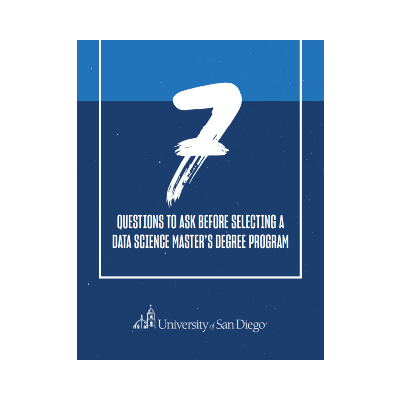Data scientists and software engineers are popular, high-paying positions that offer tremendous career growth and the ability to work within a variety of industries — but which career is right for you? In this guide, we break down all the similarities and differences between the two, including salary, education requirements, top companies hiring for these roles — and much more.
What Is Data Science?
Data science is a multidisciplinary field that employs a variety of scientific methods, algorithms and processes to analyze data and generate valuable business insights that help solve real-world problems.
What Does a Data Scientist Do?
A data scientist possesses a combination of coding, math, statistical, analytical and machine learning skills. They analyze data and present their findings in an understandable form for the organizations they work for.
Here’s a more comprehensive definition from edureka!:
“Data scientists are those who crack complex data problems with their strong expertise in certain scientific disciplines. They work with several elements related to mathematics, statistics, computer science, etc (though they may not be an expert in all these fields).
They make a lot of use of the latest technologies in finding solutions and reaching conclusions that are crucial for an organization’s growth and development. Data Scientists present the data in a much more useful form as compared to the raw data available to them from structured as well as unstructured forms.”
The role of data scientist is also a popular one, ranking high on U.S. News & World Report’s list of Best Technology Jobs.
What Is Software Engineering?
Software engineering is an innovative field that combines engineering principles with the design, development, maintenance and testing of different types of software. The goal of software engineering is to effectively evaluate products in order to create and maintain software that will meet the requirements of specific users and stakeholders.
What Does a Software Engineer Do?
A software engineer develops systems and software for businesses and works with users to determine specific software needs, according to Indeed. They design, develop, and test systems or applications, in addition to recommending software upgrades.
As CareerExplorer explains:
“A software engineer applies mathematical analysis and the principles of computer science in order to design and develop computer software. Software engineering is a branch of computer science that includes the development and building of computer systems software and applications software.”
Data Science vs. Software Engineering Comparison Table
Let’s take a quick look at the similarities and differences between these two popular roles:
| Data Scientist | Software Engineer | |
| Main Career Focus | Data-centered position that uses data to create an impact | Develops systems and software for businesses and organizations |
| Duties and Responsibilities | Collect, categorize and analyze data; create, validate, test and update algorithms and models; use data visualization software to present findings; make business recommendations to stakeholders | Design, develop and test systems and applications; maintain systems with updates and fixes; recommend software upgrades; collaborate with developers and other engineers to create software |
| Qualifications | A minimum of a bachelor’s degree in mathematics, statistics, computer science or a related field; many positions also require a master’s degree; extensive experience in math and statistics | A bachelor’s degree in computer science, software engineering, computer programing, math or a related field; certifications may be required |
| Technical Skills Required | Math and statistics, programming, data visualization, data compilation, basic machine learning skills, predictive modeling | Programming languages, software development and testing, database management, data structures, algorithms, cloud computing |
| Soft Skills Required | Good communication, logical thinking, problem-solving, analytical skills | Strong analytical skills, attention to detail, ability to work as a team, adaptability, good communication |
| Education Requirements | An advanced degree is typically required | A bachelor’s degree in a related field; an advanced degree is not typically required |
| Salary Range | $124,000–$203,000 | $63,000–$205,000 |
| Career Outlook | The career outlook for positions is expected to grow 36% between 2023 and 2033 | Career outlook for software-related positions is expected to grow 17% between 2023 and 2033 |
| Companies Hiring for These Roles | NASA, U.S. Department of Justice, Visa, U.S. Department of the Treasury, Google, Lyft, Fanatics, Microsoft, Ford Motor Company | Williams-Sonoma, the Walt Disney Company, Etsy, LinkedIn, Adobe, Netflix, Realtor.com, the Washington Post, Humana |
Sources: LinkedIn, the U.S. Bureau of Labor Statistics, Monster, the University of San Diego and ComputerScience.org.
Skills Required
The skills required for both positions do overlap, specifically when it comes to knowledge of mathematics and statistics, programming and soft skills such as good communication and the ability to effectively problem solve. But there are some distinct differences, as outlined below:
Data Scientist Skills
Compiled from KDnuggets:
- Mathematics and statistics
- Programming (Python and R)
- Data wrangling and preprocessing skills
- Data visualization
- Good communication, being a lifelong learner, team player, business acumen, ethical skills
Other skills commonly deployed by data scientists include machine learning, predictive modeling, data visualization, text mining, programming (including Python, R, SQL, Spark, Hadoop, Julia), and many more. Data scientists also need soft skills, especially oral and written communication, to present often complex concepts to stakeholders.
Software Engineer Skills
Compiled from LiveAbout:
- Math, science, engineering, and design techniques
- Strong analytical and problem-solving skills
- Strong communication and interpersonal skills
- Experience in various programming languages
- Fluency in one (or more) computer coding languages
- Multi-tasking, team player, strong attention to detail
Education Requirements
Data Scientist
A data scientist typically needs a minimum of a bachelor’s degree in a related field, such as computer science, statistics, mathematics, data science, information technology or engineering.
Advanced education, typically a master’s degree, is considered invaluable (if not essential) for the majority of data scientist positions, emphasizing the importance of further academic qualifications. Popular master’s degree options include data science, statistics, applied mathematics, computer science, business analytics, applied artificial intelligence and machine learning.
Software Engineer
Many software engineers earn a bachelor’s degree in computer science, software engineering or a related field. Internships are also highly recommended. While a master’s degree is not typically required for most positions, common paths for advanced education include master’s programs in software engineering, computer science, information technology or business administration.
Data Scientist vs. Software Engineer Salary
Both careers are positioned to earn an extremely competitive salary. The salary for each position will depend on the specific job responsibilities, how much experience is required, location of the job itself and several other factors. But to give you an idea, here are some average salary ranges.
Data Scientists
- Median salary of $108,020 (U.S. Bureau of Labor Statistics)
- National average of $112,913 (Glassdoor)
- Median salary of $103,500 (U.S. News & World Report)
Salary will also increase depending on the experience required and whether there is a supervisory role. For example, a Level 3 Data Science Manager, which typically supervises at least 10 employees, can earn anywhere from $210,000 to $275,000.
>>> Looking for a complete breakdown on data scientist salaries? Learn more about high pay in this exciting, in-demand field.
Software Engineer
National average of $147,524 (ZipRecruiter)
Average base salary of $136,247 (Built In)
Median salary of $130,160 (U.S. Bureau of Labor Statistics)
Career Outlook
The future for both positions is extremely favorable. The job outlook for data scientists is projected to grow 36% between 2023 and 2033, according to the U.S. Bureau of Labor Statistics. Employment for software developers (which includes software engineers) is projected to grow 17% during the same time period.
[RELATED RESOURCE] Prepare for success in either field. Use our checklist to select the master’s program that aligns with your career goals.
Data Science vs. Software Engineering Career Paths
Data scientists typically start in roles such as an entry-level data analyst or junior data scientist. Once becoming a data scientist, there is room to grow into a position with additional responsibilities and possibly managerial duties. These roles are often senior data scientist, principal data scientist or data science manager. Top roles in this field include director of data science or chief data strategist.
Software engineers often begin as a junior software engineer or entry-level developer, gaining proficiency in programming and software development practices. They progress to software engineering roles, and advancement leads to senior roles — such as senior software engineer or lead development — that may involve architecture design and leadership. Further career paths include software architect, engineering manager and director of engineer or chief technology officer.
Companies Hiring for These Roles
| Data Scientist – NASA – U.S. Department of Justice – Visa – U.S. Department of the Treasury – Lyft – Fanatics – Microsoft – Ford Motor Company | Software Engineer – Williams-Sonoma – The Walt Disney Company – Etsy – Adobe – Netflix – Realtor.com – The Washington Post – Humana |
Data Scientist or Software Engineer: How to Choose?
Choosing between a position as a data scientist or software engineer will depend on your career goals, interests, skills and whether you’re interested in continuing your education.
If you enjoy working with data and either have strong programming skills or a desire to learn them, you might be better suited as a data scientist. This position also requires a background in statistics, math or computer science, whereas software engineers typically have degrees in engineering or computer science.
Software engineers are interested in designing, developing and testing software applications, and while programming is often required, these types of positions build and maintain software systems, whereas data science focuses on extracting insights from data and information.
While the two positions overlap, there are some distinct differences. Network with professionals in each field and consider scheduling information interviews to learn more about each role. Explore internships, and research undergraduate and master’s degree programs to see which career might be the right fit for you.





![Preview image of Master’s Comparisons [Data Science vs. Analytics vs. 3 More]](https://onlinedegrees.sandiego.edu/wp-content/uploads/2022/01/masters-in-data-analytics-1.jpg)